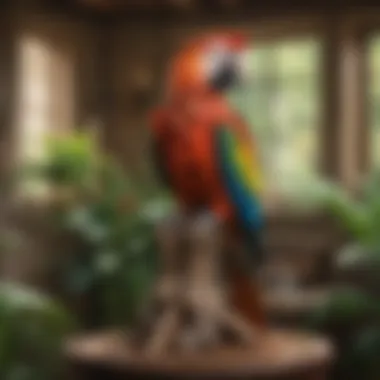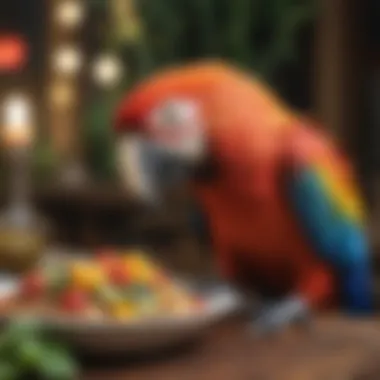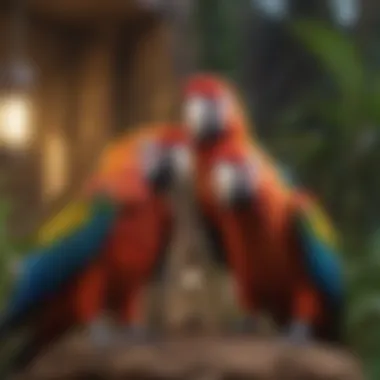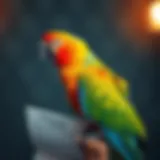Caring for Macaws: Essential Insights for Bird Lovers


Intro
Caring for a macaw is both a joy and a challenge. These vibrant birds require a meticulous approach to their care and environment to thrive. Understanding the basic principles of avian care is essential for anyone considering bringing a macaw into their home. This article will explore various aspects of macaw care. Key insights will include nutritional needs, social and environmental conditions, and health considerations. Whether you are an experienced bird owner or contemplating your first macaw, this guide offers essential information for ensuring the well-being of these compelling companions.
Avian Care Basics
Importance of Proper Nutrition
The dietary requirements for macaws are significant. Their food must be high in quality and varied. A balanced diet includes high-quality pellets, fresh fruits, vegetables, and occasional nuts. Each component provides necessary nutrients. For example, fruits and vegetables supply essential vitamins, while pellets often are fortified with minerals. Offering a diverse diet not only tackles nutritional needs but also satisfies the birds' foraging instincts.
Understanding Bird Species and Their Needs
There are numerous macaw species, each with unique requirements. Blue-and-yellow Macaw, Green-winged Macaw, and Scarlet Macaw are some common varieties. Understanding the specific needs of each species improves care and adaptation to home life. Factors like size, temperament, and behavior patterns significantly influence how one should interact and provide for them.
Basics of Birds Habitat Setup
Creating a suitable habitat is a vital part of macaw care. A large cage is crucial. It must provide enough room for flight and play. Toys, perches, and safe spaces for climbing enhance the cage environment. Macaws are active; thus, engaging environments reduce boredom and stress. Additionally, placement of the cage in a busy area of the home helps them feel part of the family.
Grooming and Hygiene Tips
Regular grooming keeps macaws healthy and comfortable. Nail trimming, beak care, and feather maintenance are important. It's advisable to check their feathers for damage or dirt. A bath can be beneficial. Some macaws enjoy experiencing water. Moreover, a clean environment minimizes potential health issues. Schedule routine checks and consider guidance from an avian vet if unsure about care methods.
Interacting with Your Pet Bird
Building Trust and Connection
Establishing a bond with a macaw takes time and patience. Regular interaction helps the bird feel secure around people. Start with gentle approaches, such as speaking softly and slowly offer treats along. Their unique personalities blossum in a comfortable setting.
Training Techniques and Tips
Training a macaw holds both benefits and pleasure. Positive reinforcement is critical. Use treats to reward desired behaviors. Basic commands like
Understanding Macaws
Understanding macaws is fundamental for anyone considering them as pets or working with them in any capacity. Their complex nature requires careful consideration of their needs and behaviors. Knowing about macaws should involve an exploration of their species diversity, habitats, and natural behaviors. This knowledge is crucial not only for ensuring a healthy and stimulating environment for them but also for forming a meaningful bond. The more one understands these remarkable birds, the better prepared they are for successful ownership or care.
Species Overview
Macaws are a group of large, colorful, long-tailed parrots that primarily belong to the family Psittacidae. Notable species include the Blue and Gold Macaw, Scarlet Macaw, and Green-winged Macaw. Each species has distinct physical characteristics, including differences in coloration, size, and temperaments. While the average long lifespan is around 30 to 50 years, it greatly varies based on species and environmental factors. Certain macaws tend to be more social, whereas others may demonstrate independent behaviors.
Understanding this diversity helps potential owners choose the right species for theselves and recognize the specific care needs associated with each one.
Natural Habitat and Behavior
Macaws can be found in various habitats in Central and South America. Lush rainforests, savannas, and mountainous woodlands serve as their primary environments. In these areas, they feed mainly on fruits, seeds, nuts, and even flowers. In the wild, they often live in social groups which contribute to their mental stimulation. Environmental enrichment in their living space is essential; it might include different varieties of branches, feeding stations, and toys.
Behavioral traits include:
- Social interactions: Living in flocks enhances their social skills and ability to communicate effectively.
- Exploratory activity: They are curious and require stimulation to prevent boredom. Without proper engagement, destructive behavior can develop.
Choosing the Right Macaw
Choosing the right macaw is fundamental for ensuring a harmonious and long-lasting relationship between the owner and their feathered companion. This section will explore significant factors that go into selecting a macaw, touching on things such as breed characteristics, lifestyle compatibility, and housing needs. Understanding these elements will allow potential bird owners to make informed decisions that best suit their needs and can lead to a more enriching experience with their macaw.
Selecting a Breed
When selecting a macaw breed, it is vital to consider traits such as size, temperament, and vocalization. Macaws range from smaller species like the Hahn’s macaw to larger varieties like the Hyacinth macaw. Size directly impacts housing and space requirements, so knowing the expected adult size is crucial.
Temperament also varies considerably by breed. While some breeds are typically more social, others tend to be more independent or reserved. For instance, the Blue-and-yellow macaw is often described as friendly and playful, making it suitable for families, whereas the Green-winged macaw could be better for more experienced bird owners due to its strong personality.
Vocalization is another significant consideration. Some macaws are notorious for being loud; a skilled owner might embrace this noise, while others could find it disruptive. Educate yourself about each breed’s common sounds, so you choose one that fits your lifestyle. In short, understanding the specific needs and characteristics of different macaw breeds will guide new owners toward a choice more aligned with their living situation.
Buying vs.
Adopting
Another vital decision is whether to buy a macaw from a breeder or adopt one from a rescue organization. Both options have advantages and pitfalls. Purchasing from a reputable breeder typically ensures that the bird comes with proper documentation, including its lineage and health records. Responsible breeders engage in ethical practices, which includes socializing birds and ensuring they receive necessary veterinary care.
On the other hand, adopting a macaw can offer a loving bird a second chance at a home. Many birds in rescues are in need of companionship and make excellent pets. It can be particularly fulfilling to provide stability to a bird that may have faced challenges. However, it’s crucial to note that adoption may come with unknown histories or health concerns requiring attention.
When making this choice, ask yourself:
- What are your priorities? Does health or temperament take precedence?
- What resources do you possess? Can you afford a potentially higher veterinary cost trend with adopted birds?
- How much time do you have to commit? Adopting a macaw often means adopting its needs for rehabilitation and patience.
Ultimately, understanding the value of both processes allows you to make the right decision, providing a happy home for your avian companion.
"Choosing the right macaw involves understanding its needs, both physical and emotional. A well-informed decision leads to a more enjoyable experience for both the bird and you."
By taking the time to gather this crucial information, prospective owners can form a clearer picture. In adherence to responsible ownership, the pathway from selection to acquisition requires diligence and insight.


Nutrition and Diet
Nutrition is fundamental for the overall health and well-being of macaws. These birds require a balanced diet that not only supports their physical health but also enhances their mental and emotional well-being. Proper nutrition impacts every aspect of a macaw’s life, including feather quality, energy levels, and lifespan. Understanding what to feed macaws promotes healthier living and reduces the risk of obesity or nutritional deficiencies.
Essential Nutrients
A macaw's dietary needs are diverse. Below are some key nutrients that should be part of their daily intake:
- Proteins: Essential for muscle development and overall body repair. This can be found in seeds, nuts, and even some pellet mixes.
- Fats: Healthy fats contribute to energy needs and overall condition. Sources include nuts and certain seeds.
- Carbohydrates: Important for energy, should come from fruits, vegetables, and grains.
- Vitamins: Vitamins A, D3, and E are crucial. Fresh fruits and veggies can provide these essential vitamins. A deficiency can lead to severe health issues.
- Minerals: Calcium and phosphorus balance is vital for healthy bone development. Grit or homemade supplement mixtures can help meet these needs.
Providing a balanced intake of these nutrients ensures that the macaw remains active, vibrant, and less prone to health issues.
Recommended Foods
Choosing appropriate foods is miserable important. Here’s a list of ideal foods for macaws:
- Fruits: Apples, bananas, and berries. These provide both vitamins and hydration.
- Vegetables: Leafy greens, bell peppers, and carrots. Rich in fiber and essential nutrients.
- Nuts and Seeds: Almonds, walnuts, and sunflower seeds. These should be offered in moderation due to high-fat content but are good for variety.
- Pellets: High-quality, specifically formulated macaw pellets can serve as the foundation of their diet. Make sure the pellets are free from artificial preservatives or additives.
This diet creates a colorful, enriching daily menu for your macaw and is essential for promoting their overall health.
Feeding Schedule
Establishing a consistent feeding schedule is key for a macaw’s health. Here is a recommended feeding routine:
- Twice Daily Feeding: Offer meals in the morning and late afternoon. This consistency helps mimic natural foraging habits.
- Fresh Produce: Provide fruits and vegetables daily, which should be consumed within a few hours to keep them fresh.
- Nut and Seed Treats: Nuts can be set aside for training sessions or as occasional treats rather than regular meals.
- Monitor Portion Sizes: Adjust portions based on the bird’s activity level and health condition. They do well with a mix of foods, but ensure not to overfeed nuts and seeds due to calorie density.
Regular and balanced feeding is more than just nourishing your macaw; it is vital to help them live longer and healthier lives, fostering a close bond with their caregivers.
Adherence to this feeding structure will maintain your macaw’s energy levels and prevent obesity along with any dietary illnesses. Consistency builds trust while allowing it to derive satisfaction from feeding strongly.
Environmental Considerations
Creating the right environment for a macaw is essential for their overall health and well-being. Macaws are large, intelligent birds with specific needs that must be met in order to ensure their happiness and development. The considerations within their environment can significantly influence their behavior, mental stimulation, and health.
Cage Setup
A well-designed cage is the foundation of a macaw's habitat. The size of the cage should offer ample space for movement, as macaws require flight and exercise. It is recommended to have a cage that measures at least 5 feet high, 4 feet wide, and 3 feet deep for a single macaw, enabling the bird to stretch and flap its wings adequately. Typically, the materials should be sturdy and non-toxic. Good choices include stainless steel or powder-coated metal that can withstand chewing. Regular cleaning of the cage is different too is critical to prevent health problems, as macaws can be messy eaters.
In the cage, include perches of various diameters to promote foot health. Natural wood branch perches, untreated, are ideal since they engage their natural instincts to climb and explore. Add a few hiding spots where they can feel secure, as well as feeding stations that are elevated but away from the droppings. This cage setup not only provides physical comfort but fosters psychological stimulation.
Toys and Enrichment
Mental stimulation is as important as physical activity for macaws. Toys specific to their size—such as ropes, wood blocks, and chewable items—are crucial for preventing boredom and associated behavioral issues. Rotate toys regularly to keep the macaw engaged. This act deteriorates boredom and provides fresh challenges that cater to their inherent curiosity.
Additionally, consider interactive toys such as puzzle feeders. This type of enrichment encourages problem-solving behaviors while making meal times engaging. Importantly, ensure that all toys adapt to non-toxic materials to ensure the safety of your macaw.
Temperature and Climate Control
Control of temperature and humidity is another vital aspect of a macaw's environment. These birds thrive in temperatures between 65°F and 85°F. Sudden temperature fluff regressions or drafts can lead to distress or health concerns.
A well-ventilated environment extends to considerations such as having an indoor area that is not placed abruptly near air conditioning units or heaters. Ideally, the humidity levels should also maintained around 40 to 60 percent, which ensures that the macaws immune systems remain robust.
It's essential to monitor seasonal changes and prepare them accordingly. Small adjustments like humidifiers or central heating may be necessary. Keeping your macaw comfortable enhances their quality of life and reduces stress.
A properly arranged environment can translate to a happier and more engaged macaw, impacting their human interactions and behaviors positively.
Social Needs
The social needs of a macaw are fundamental to their overall wellbeing and happiness. Macaws are inherently social creatures, thriving on interaction and companionship. Recognizing the necessity of fostering a social environment is crucial for anyone owning these vibrant birds. Social interaction lays the groundwork for building trust, reducing stress, and promoting engaging behaviors that are essential to macaw care.
Bonding with Your Macaw
To establish a strong bond with your macaw, consistency and patience are paramount. Daily interaction helps to develop familiarity and trust. Here are some strategies for effective bonding:
- Create a Routine: Consistent daily timings for feeding and play can have a positive impact. Establishing a predictable schedule allows your macaw to feel secure.
- Hands-On Interaction: Gradually acclimatize your bird to being handled. Start with short periods and, as comfort levels grow, increase the time spent during handling. Slowly offering treats can help foster a sense of safety and companionship.
- Understand Body Language: Recognizing signs of aggression or fear is vital. Observe your macaw's posture, gestures, and vocalizations to gauge its comfort levels. Always allow your bird to approach on its terms while refraining from excessive force.
Engaging in intimate activities, such as cuddling or gentle scratching, can enhance this bond. However care should be taken not to overwhelm your macaw, allowing independence remains essential.
Importance of Interaction
Interaction with your macaw is not merely beneficial; it is an essential aspect of their life. Several considerations underline the therapy of friendship with these intelligent birds:
- Cognitive Stimulation: Regular interaction involves challenges that help stimulate their minds. This can alleviate boredom and behavioral issues that stem from lack expansive stimulation.
- Emotional Wellness: Just like humans, birds develop a range of emotions. Lack of interaction can result in loneliness, potentially leading to stress or depression. Enriching their daily routines with constant interaction reduces the impact of environmental stressors.
- Behavior Management: Problems like nipping or vocal outbursts can often signal attention-seeking behavior. By engaging your macaw attentively, you can curb undesired behaviors and continue nurturing a healthy environment.
Engaging regularly fosters a happy environment which inevitably enhances your bond whilst reducing potential stress.
Effective interaction is broken down into verbal and physical engagements, ensuring you need both avenues. Merely talking to your macaw positively stimulate its attention and reinforce the relationship. Conversely, physical activities such as playing with toys is another way to effectively create an interaction.
Health and Wellness


The health and wellness of macaws is a paramount consideration for anyone devoted to their care. This aspect not only determines the quality of life for these intelligent birds but also impacts their behavior, lifespan, and relationship with their owners. Macaws require attentive care, just like any other living being. Many factors influence their health—diet, environment, social interaction, and regular veterinary care are all crucial.
Practicing preventive care ensures that health issues are identified before they escalate. Doing so enhances the human-macaw bond, reflecting on the overall happiness of the bird. Owners should make it a point to understand the specific needs of their macaw and regularly evaluate their health status.
Common Health Issues
Macaws can suffer from several common health issues. Understanding these problems can help owners act before serious complications arise.
- Ailments from Poor Nutrition: Malnutrition can lead to feather plucking, weight loss, and diseases like fatty liver.
- Respiratory Problems: Dust, mold, or allergens can cause respiratory illness. Birds are sensitive creatures, thus clean air is mandatory.
- Bacterial Infections: These can quickly arise from poor hygiene or contaminated water and food sources.
- Psittacosis: This is a bacterial disease common in parrots. It can be detrimental to both bird and human health.
Identifying these issues promptly encourages a rewarding ownership experience and ensures your macaw remains active and playful.
Regular Vet Check-ups
Scheduling regular check-ups with a veterinarian specialized in avian care is critical. Vets can conduct comprehensive health assessments and preventative treatments. Such visits help spot potential health issues early on.
A routine vet visit should include:
- Daily weight checks: Monitoring weights can indicate health status shifts.
- Feather and skin exams: Ensuring no parasites or infections are present.
- Blood Tests: Can help detect diseases that are asymptomatic.
- Nutritional Advice: Guidance regarding diets specific to macaws.
Regular visits build a rapport between the owner and the vet, allowing for better management of the bird's health.
In practice, health guarantees can only be achieved through proactivity in regular care techniques.
Signs of Illness
Recognizing the subtle signs of illness in a macaw is critical. They cannot verbally express discomfort, making observance key. Here are signs to watch for:
- Change in Vocalization: A sudden refusal to speak or unusual sounds may indicate distress.
- Altered Eating Habits: Decreased appetite could signify issues, as well as excessive eating.
- Lethargy: A drop in activity level is often a strong indicator of problems.
- Feather Changes: Dull feathers or patches of absence can reflect health issues.
- Change in Droppings: Abnormal droppings can reveal various health problems ranging from gastrointestinal infections to organ issues.
Simple observations can significantly alter your macaw's quality of life. Early detection allows for timely intervention.
Health and wellness must remain a priority for macaw owners. Knowledge, vigilance, and proactive behavior will not only safeguard your macaw’s well-being but also influence the entire companion experience.
Training Your Macaw
Training a macaw is an essential part of its care. It fosters communication and a stronger bond between you and your bird. Training can make life easier and more enjoyable for both pet owners and their feathered companions. Behavioral commands along with social training encourage your macaw to learn trust, making it a more rewarding experience.
Basic Commands
Teaching basic commands is the foundation of macaw training. Simple commands like “step up,” “come,” and “stay” are important first steps. These phrases help your bird understand what you want. Positive reinforcement is effective here. When your macaw obeys, offer a treat or verbal praise. Patience plays a large role because every bird learns at its own pace.
When choosing commands, keep it short and consistent. It is useful to use the same word for actions. For example, only use “step up” when encouraging your macaw to perch on your hand. Simplification assists clarity.
Tips for Teaching Basic Commands:
- Start in a quiet environment where your macaw feels safe.
- Use a calm voice with a normal volume.
- Be persistent despite setbacks; repetition reinforces learning.
Behavioral Training
Behavioral training involves teaching your macaw about expected behaviors. Unwanted behaviors could lead to stressful experiences for both the owner and the bird. Addressing behaviors like screaming, biting, or feather plucking becomes vital.Avian behavioral training relies on positive reinforcement, similar to basic commands.
Introduce behaviors gradually, working week by week. For example, reward your macaw for choosing an appropriate perch rather than its wings. This approach gradually builds the macaw’s understanding of what is acceptable. Careful observation is essential.
You might notice a situation causing unwanted behavior, such as loud noise or strangers. Observing can help react proactively and can avoid reinforcing negative behaviors. Consult avian professionals if behavior problems escalate.
“Understanding the connection between behavior and training ensures your macaw learns effectively without fear or anxiety.” - Avian Trainer
Strategies to Improve Behavioral Training:
- Provide enrichment: Toys and activities can keep your macaw mentally stimulated.
- Consistent schedule: A daily practice routine helps habits form naturally.
- Recognize triggers: Understanding what sparks unwanted behavior allows you to manage it better.
Training is an ongoing process. Regular practice enriches the bond you have with your macaw. You will find training rather engaging, ultimately growing your relationship with your pet bird.
Legal and Ethical Considerations
Caring for a macaw involves not just the daily tasks of feeding and nurturing, but is deeply enmeshed in legal and ethical concerns. Understanding the partnership between responsibility and the law is crucial in guaranteeing a secure and enriching atmosphere for both the bird and its owner. This awareness helps you navigate the complexities and potential challenges of macaw ownership. Ignoring these elements could lead to legal maladies and negate the sake of good ethics in raising a macaw.
Understanding Regulations
Each country and even states or regions enforce specific regulations regarding macaw ownership. It is key to grasp these regulations during the ownership process. Time invested in legal research will positively impact both the well-being of the macaw and the peace of mind for the owner. Some common aspects that tend to arise regard:
- Minimum cage sizes to ensure the physical well-being of the bird.
- Licensing requirements for owning certain breeds.
- Regulations surrounding breeding practices, especially if planning to breed the parrot.
Moreover, failure to adhere to these guidelines can lead to fines or even confiscation of the bird. The emotional ramifications are also substantial. Many would find it deeply upsetting to no longer care for a bird they often consider part of the family. Automating compliance via a checklist can prove helpful products.
Regularly check local laws; they can change frequently. Knowing your legal obligations is your shield against potential missteps.
Therefore, consider connecting with an avian vetor qualified avian hoangle for a proper consultation and nest every necessary wigi along mucroviations regarding regulations.


Importance of Ethical Breeding
Decisions surrounding breeding practices have morally extensive ramifications. Responsible breeding impacts the overall population of macaws and reflects on the health standards upheld by that particular avian community. Emphasizing ethical breeding is thus not only a chore for regeiners but a responsibility shared by thopy all macaw owners. Important points to contemplate include:
- Verify lineage. Ensure there is no crossing of subspecies that could weaken genetic lines.
- Avoid inbreeding, as it generally leads to a greater risk of health issues.
- Promote habitats that sancen comfort and safety to breeding males and females.
Ethical breeding also encourages communities to band together in support and awareness. Wall live spreads awareness about the scientific understanding of the substantial issues associated with breeding dilemmas.
By approaching both ownership and breeding with the proper ethical mindset, a deeper bond can be formed, affording a flourishing bond between the owner and the macaw.
In summary, legal understandings and laboratory breeding ethics intertwine interdependently, ensure safe environments connecting macaws strong ex’s above times guaranteeing efforts spent to take dung brothers around pamcrushing.
Traveling with Your Macaw
Traveling with a macaw requires careful consideration and responsible planning. Macaws are sensitive creatures who thrive in stable environments. Unfamiliar places can create discomfort and distress for these birds. Therefore, it is vital for macaw owners to understand the implications of travel and how to keep their avian companions safe and comfortable.
Preparation and Safety
Before embarking on your trip with a macaw, thorough preparation is paramount. Here are several crucial steps to ensure safety and comfort:
- Carrier Selection: Choose a suitable travel carrier for your macaw. It should be sturdy and well-ventilated, with enough space for your bird to move comfortably.
- Behavior Assessment: Get to know how your macaw behaves in new situations. Engaging in gradual desensitization can ease anxiety related to travel.
- Health Check: Schedule a visit to the veterinarian prior to travel. This will ensure that the macaw is healthy and fit for the journey.
- Travel Schedule: Plan your trip wisely, preferably during quieter hours at airports if flying. This reduces stress caused by large crowds and noise.
Preparing for travel extends beyond packing; having a comprehensive safety plan helps mitigate risks and underline the responsibility of macaw ownership in every aspect.
Choosing Pet-Friendly Accommodations
Selecting the right places to stay during travel can immensely affect your macaw’s comfort and wellbeing. Here are a few important considerations when choosing accommodations:
- Pet Policy: Confirm that the hotel or rental allows macaws. Policies vary widely, and some places may charge additional fees for pets.
- Safety and Space: Assess the environment for potential hazards. Ensure areas are safe and spacious enough for your macaw's movement.
- Amenities: Look for amenities that cater to pets, such as available outdoor spaces or secure balconies. Your macaw will appreciate the opportunity to stretch its wings.
- Access to Resources: Check for nearby shops where you can buy supplies, such as food and toys. Being able to access these easily will help maintain your macaw’s routine.
Humans creating a harmonious transition helps their makeshift habitats reflect home-like qualities. This can facilitate a smoother travel experience overall for you and your macaw.
Effective traveling with a macaw requires more than just putting the bird in a carrier and hitting the road. Careful preparation and thoughtful accommodations ensure you and your macaw enjoy a safe and delightful experience.
Creating a Harmonious Home
Caring for a macaw involves much more than feeding and providing a large cage. Creating a harmonious home is a fundamental aspect of macaw ownership. This aspect significantly shapes the overall well-being of your pet and can influence its behavior as well as health.
A harmonious enviroment reduces stress for the macaw and fosters positive social interactions. It also eliminates factors that can cause agitation or anxiety, both of which are prevalent in birds, especially in a new setting. Ensuring mutual respect and comfort both for the owner and the birds is paramount.
Maintaining clear communication with the household is crucial. All family memebers need to understand how to approach the bird. Each partner in this relational dynamic contributes to an atmosphere that feels safe and inviting for your feathered friend.
A well-integrated home setup serves multiple benefits:
- Stress Reduction: Helps in minimizing triggers that can lead to behavioral issues.
- Enhanced Interactions: A positive space encourages bonding between pets and owners.
- Overall Mental Health: Happy surroundings boost a macaw’s emotional well-being, which is vital.
Integrating with Other Pets
Introducing a macaw into a household with existing pets must be done carefully. Birds have a distinct set of social behaviors, different from dogs or cats. Understanding these differences can steer successful interactions. Macaws are naturally curious and can mistake smaller pets for their avian playmates.
First, it is important to supervise early encounters. A slow introduction allows both the macaw and the other pets to acclimate without feeling threatened. It might be helpful to place the macaw in a separate area at first. Use barriers like baby gates or designated rooms where each animal can see or hear, but not directly access each other. Progressing to face-to-face interactions can occur when you feel comfortable. Not all animals naturally bond; recognizing boundaries is key. Use your observations to inform these decisions.
It can help to train pets for obedience commands such as 'no' or 'stay' as well. This reduces exciting or disruptive behavior during introductions. In some cases, providing rewards during gatherings builds a positive reinforcement culture for the interaction.
Establishing a Routine
Routines offer structured elements, helping the macaw feel secure in its human household. Birds thrive on predictability, making established rituals vital for both temperament and behavior. Consistent feeding times, exercise opportunities, and bonding time contribute to a sense of stability.
Feeding can be scheduled at designated times through a suitabe daily calender. In addition, setting aside activity this may include exercise or simply unstructured play can lead to enthusiastic engagement from the macaw. Furthermore, planned social periods foster trust and warmth, essential for sound relationships.
Overall, developing a careful and thoughtful routine allows your macaw to flourish. You foster a comforting predictability that helps prevent behavioral challenges and enhances overall companionship. Leaving ample space for play and rest within a routine bears great dividends for macaw well being.
Understanding the Lifespan of Macaws
Understanding the lifespan of macaws serves a crucial role in their care. It is essential for potential and current owners to grasp the commitment required to nurture these birds over their long lives. Macaws can live for several decades, often between 30 and 50 years, depending on various environmental and health factors. This life expectancy means that adopting a macaw is not a temporary commitment but potentially a lifelong one, impacting both the owner’s and the bird’s quality of life.
Owners are not just care providers; they become life companions. Awareness of the typical lifespan can bolster responsibility in terms of provisioning the necessary care for #one’s beloved macaw. Proper preparation also involves taking into account how life circumstances may change over time. Assessing the emotional, financial, and logistical aspects of your life allows for a deeper understanding of the necessary commitment, placing owners in a position to take judicious decisions.
Average Lifespan and Factors Affecting It
Macaws have considerable variation in lifespan influenced by myriad factors. A well-cared-for macaw has the potential to achieve longevity. Common factors contributing to their lifespan include:
- Diet and Nutrition: Feeding your macaw balanced nutrition assists in disease prevention and overall health. A diet rich in vitamins, minerals, and fresh produce enhances their quality of life, thereby affected by longevity.
- Environment: Secure and spacious housing integrated with stimulating toys provides physical and mental enrichment. An unhealthy environment can lead to stress or illness that severely impacts their life span.
- Regular Veterinary Care: Scheduled check-ups and prompt treatment for health issues can help anticipate conditions that hinder a macaw’s longevity.
- Exercise Opportunities: Ensuring adequate space for flight and play directly affects both physical fitness and mental well-being of macaws.
Understanding these aspects enables responsible care that not only lengthens life but also enriches it.
End-of-Life Decisions
As macaws age, owners will face unsettling decisions regarding their health care. Preparing for these moments can ease the process and lead to more compassionate decisions. Several aspects warrant consideration, including:
- Understanding Natural Aging Signs: Watching for changes in behavior and health may signify the eventual decline. Types of signs can vary; reduced appetite or playful behavior could be precursors to deeper health concerns.
- Quality of Life Assessments: Family must consider what quality of life the macaw presently experiences. Sometimes interventions or treatments can prolong life, but they may come at the expense of comfort or happiness.
- End-of-Life Care Options: Exploring humane options, including palliative care and veterinary euthanasia, are fraught with emotion yet critical in considering how to transition gracefully for both the macaw and their family members.
Honesty and compassion guide these final decisions and ensure respect for the bond shared between the bird and its owner.
“End-of-life decisions are never easy but being prepared leads to more humane outcomes.”
In summary, understanding the lifespan of macaws encompasses many elements affecting care. Approaching the understanding and acceptance leads to informed ownership that can profoundly impact us and these social creatures we hold dear. Thorough knowledge becomes an invaluable tool guiding decisions from infancy through life’s conclusion.















